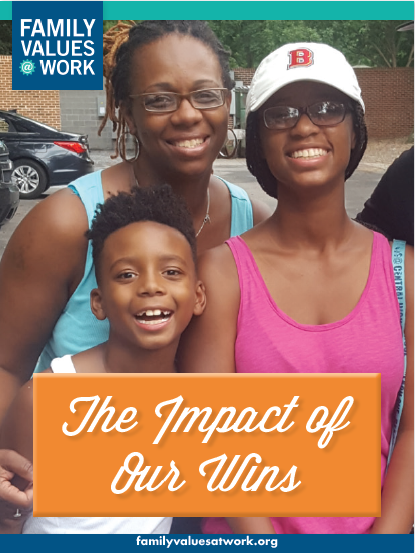When the Family and Medical Leave Act finally became law 24 years ago, someone from the local Chamber of Commerce cornered me to complain. The new law provided up to 12 weeks unpaid leave to care for a new child or a serious personal or family illness. “This is just a foot in the door for people like you,” the lobbyist complained. “You’ll be coming back for more.”
My reply? “We’ll keep organizing until no one loses their job or their paycheck for being a good family member.”
Nearly two and a half decades later, the FMLA is still the only law protecting caregivers. While it represented a great step forward by establishing the principle that having a family shouldn’t cost you your job, those of us who fought for it knew then that it wouldn’t be enough. For starters, it leaves out 40 percent of the workforce. The definition of family is very narrow. And each year, millions who are covered and need leave can’t take it or go back to work too soon, mostly because the time is unpaid.
The U.S. remains the only industrialized nation with no national paid leave program of any kind. Only 14% of the private sector workforce receives paid family leave through an employer, and only 40% receive short-term disability. That translates into an astonishing number of pregnant workers – nearly one in four – going back to work within two weeks of giving birth.
As that lobbyist anticipated, our movement didn’t stop. Today five states have passed family and medical leave insurance programs. Over the next two to three years, we may double that total, laying the basis for passage of a strong federal standard to cover everyone.
There are many ways to measure the significance of these wins: the number of people touched (25 million when the current laws are all fully implemented); studies showing the many benefits for individuals, businesses, and communities; polls showing overwhelming public support.
But perhaps nothing demonstrates the importance of the wins more than the stories of everyday Americans, the very people who are helping make these victories possible.

Download the free booklet, Impact of Our Wins
We’ve put together a sampling of these stories in this booklet. They include people like Danny Contreras and Al-Nisa Smith, whose leave allowed them not only to bond with a baby but to help turn around an older child with special needs; Megan Lomba, who was able to give round-the-clock care to her mother after a terrible fall; Lauren Agoratus, who used paid leave for her daughter’s kidney transplant without losing her home or being weighed down with debt; and Dana Ginn Paredes, who could provide complicated care for her partner as well as lay a solid foundation for their new son.
Those who benefit from state paid leave programs worry about loved ones who live in places that have none. That’s why they’re also working for passage of a national fund.
On February 7, Sen. Kirsten Gillibrand and Rep. Rosa DeLauro are re-introducing the FAMILY Act, with more sponsors than in previous years. This bill would establish a national social insurance fund, paid for with small contributions from employees and employers, so that workers could draw a wage while healing or tending to a family member in need of care.
I hope that lobbyist is paying attention. We mean to ensure that family values don’t end at the workplace door. The reasons are simple: We all have a stake in providing a healthy start for children. Those who aren’t parents have parents or partners or other loved ones who may need care, or may themselves need time to heal. As President Obama noted, we can no longer afford the high cost of doing nothing. A national paid leave fund will bring a wide range of intended consequences, enhancing the well-being of individuals, families, businesses and the nation.
The victories in the states, and the people whose lives have been transformed, are creating the models to ensure we get to a national program. Together we will keep coming back until we can guarantee a triple A rating: leave that is accessible, affordable and adequate for all.
by Ellen Bravo.